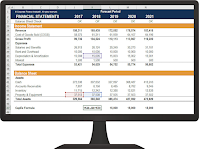Engagements to report on summary financial statements
Summary financial statements is historical financial information that is derived from financial statements but that contains less detail than the financial statements, while still providing a structured representation consistent with that provided by the financial statements of the entity’s economic resources or obligations at a point in time or the changes therein for a period of time. Different jurisdictions may use different terminology to describe such historical financial information.
Example of summary financial statements (Summary statement of financial position) is presented below.
Considerations related to the audit of summary
financial statements engagement.
The auditor shall accept an engagement to
report on summary financial statements only when the auditor has been engaged
to conduct an audit of the financial statements from which the summary
financial statements are derived.
Before to accept an engagement to report on summary financial statements, the auditor shall:
· Determine whether the applied criteria are acceptable. Because summary financial statements by their nature contain aggregated information and limited disclosure, there is an increased risk that they may not contain the information necessary so as not to be misleading in the circumstances. The criteria for the preparation of summary financial statements may be established by an authorized or recognized standards setting organization, by law or regulation or may be developed by management.
· Obtain the agreement of management that it acknowledges and understands its responsibility.
· Agree with management the form of opinion to be expressed on the summary financial statements.
The nature
of procedures related to auditing summary financial statements.
Before to form an audit opinion on the summary financial statements the auditor shall perform the following procedures:
· Evaluate whether the summary financial statements adequately disclose their summarized nature and identify the audited financial statements.
· Evaluate whether the summary financial statements adequately disclose the applied criteria.
· Compare the summary financial statements with the related information in the audited financial statements to determine whether the summary financial statements agree with or can be recalculated from the related information in the audited financial statements.
· Evaluate whether the summary financial statements are prepared in accordance with the applied criteria.
· Evaluate whether the summary financial statements contain the information necessary, and are at an appropriate level of aggregation, so as not to be misleading in the circumstances.
· Evaluate whether the audited financial statements are available to the intended users of the summary financial statements without undue difficulty, unless law or regulation provides that they need not be made available. The summary financial statements describe clearly from whom or where the audited financial statements are available. The audited financial statements are on public record.
An example of an auditor's report on the summary financial statements is presented below.






Comments
Post a Comment